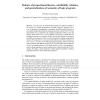Free Online Productivity Tools
i2Speak
i2Symbol
i2OCR
iTex2Img
iWeb2Print
iWeb2Shot
i2Type
iPdf2Split
iPdf2Merge
i2Bopomofo
i2Arabic
i2Style
i2Image
i2PDF
iLatex2Rtf
Sci2ools
164
click to vote
ICLP
2009
Springer
2009
Springer
Reducts of Propositional Theories, Satisfiability Relations, and Generalizations of Semantics of Logic Programs
Over the years, the stable-model semantics has gained a position of the correct (two-valued) interpretation of default negation in programs. However, for programs with aggregates (constraints), the stable-model semantics, in its broadly accepted generalization stemming from the work by Pearce, Ferraris and Lifschitz, has a competitor: the semantics proposed by Faber, Leone and Pfeifer, which seems to be essentially different. Our goal is to explain the relationship between the two semantics. Pearce, Ferraris and Lifschitz's extension of the stable-model semantics is best viewed in the setting of arbitrary propositional theories. We propose here an extension of the Faber-Leone-Pfeifer semantics, or FLP semantics, for short, to the full propositional language, which reveals both common threads and differences between the FLP and stable-model semantics. We use our characterizations of FLP-stable models to derive corresponding results on strong equivalence and on normal forms of theor...
Arbitrary Propositional Theories | FLP Semantics | ICLP 2009 | Programming Languages | Stable-model Semantics |
| Added | 22 Nov 2009 |
| Updated | 22 Nov 2009 |
| Type | Conference |
| Year | 2009 |
| Where | ICLP |
| Authors | Miroslaw Truszczynski |
Comments (0)

